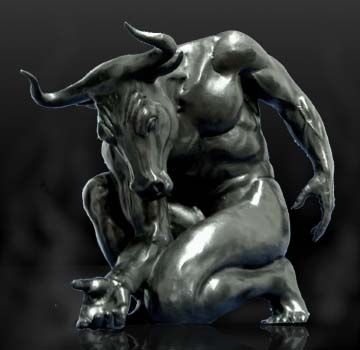When people talk about the ancient mythological creature Minotaur, a ferocious beast immediately comes to mind and perhaps the infamous myth of the labyrinth as well. What people may not know, though, are the interesting details of the events that lead up to the birth of the mighty Minotaur. What is universally recognized as a feared creature of unusual birth was actually created from unfortunate actions between a selfish king and a vengeful god.
King Minos and his wife Queen Pasiphae led a good life ruling over the island of Crete. Minos held power over multiple islands of Greece and was recognized for his success and power by many. In an attempt to prove his rightful claim as King of Crete, Minos had sworn to locate the best bull he could find among his cattle, one that would be very favorable to its intended receiver. Minos would then take this great bull and sacrifice it to Poseidon, god of the seas, as he did each year in order to secure his ownership of the throne. One year in particular, among King Minos’ herd, there birthed a magnificent bull, one that possessed a unique kind of beauty that King Minos had never seen before. Minos truly was in awe of this magnificent bull, so much so that he found himself captivated by its beauty, and he realized that this bull was something he did not want to give up to the promised Poseidon. In fact, Minos purposefully chose to overlook the magnificent bull when making his decision, and settled on a less attractive bull to sacrifice to Poseidon.1

Watching him and his deceitful actions very closely, Poseidon took notice of King Minos’ plan in sacrificing a lesser bull to keep the best for himself. This made Poseidon very angry, and he immediately began thinking about how to discipline Minos for his selfishness. Poseidon saw that Minos loved his wife Pasiphae immensely, and with this knowledge, constructed a plan that would leave Minos and Pasiphae in the presence of a monster. 2
Poseidon cast a curse upon Queen Pasiphae, one of love, which she could not escape. Her love was not for her husband; instead, she felt love for his magnificent bull. Pasiphae would be found swooning over the magnificent bull as if it were a handsome and powerful man ready to take her into his strong arms. Alas, she was so utterly infatuated with the magnificent bull that she constructed a plan to lure the bull towards her, and hopefully lay with her romantically.3
Queen Pasiphae instructed a craftsman of the island, Daedalus, and his son, Icarus, to build her a wooden structure that represented a near-perfect body form of a female bull. She insisted that the piece be built as realistically as possible and large enough for herself to comfortably fit inside without revealing that she was human. In spite of her odd orders, Daedalus and Icarus did what the Queen asked of them. As a finishing touch, Queen Pasiphae placed a large cow hide over the structure so that the magnificent bull would notice the structure and take it as a female looking to mate. The Queen rolled the structure out to the field where she would often see the magnificent bull grazing day after day. She strategically placed herself in the view of the magnificent bull, stepped inside the structure, and waited patiently for the bull’s approach.4

After grazing for a bit, the magnificent bull caught sight of what it thought was the beautiful female and approached it. Before long, the Queen’s plan worked, as the magnificent bull fastened itself upon her and together, engaged in sexual and intimate relations. As a result of this, Queen Pasiphae became pregnant with the baby of the bull and upon its birth realized she was carrying something horrific inside of her.5
Just as Poseidon intended, Pasiphae had relations with the bull she loved and later birthed an unusual creature, born half-bull, half-human to be known as the Minotaur.

The creation and birth of the Minotaur, as well as other monsters, typically is done in response to acts of sin. In this particular case, King Minos’ egotistical actions led him to break a promise made to a god, and in return, that god made Minos’ wife feel the same love that her husband did for the magnificent bull, giving in to her abnormal fascination and eventually birthing an infamous monster of ancient Greece.6
- UXL Encyclopedia of World Mythology, 2009, s.v. “Minotaur.” ↵
- UXL Encyclopedia of World Mythology, 2009, s.v. “Minotaur.” ↵
- Christian Moevs, “Centaurs, Spiders and Saints,” in Vertical Readings in Dante’s Comedy: Volume 2, edited by Corbett George and Webb Heather (Cambridge, UK: Open Book Publishers, 2016), 14-17. http://www.jstor.org/stable/j.ctt1sq5vb5.7. ↵
- UXL Encyclopedia of World Mythology, 2009, s.v. “Minotaur.” ↵
- Christian Moevs, “Centaurs, Spiders and Saints,” in Vertical Readings in Dante’s Comedy: Volume 2, edited by Corbett George and Webb Heather (Cambridge, UK: Open Book Publishers, 2016), 14-17. http://www.jstor.org/stable/j.ctt1sq5vb5.7. ↵
- George Palmer Garrett, “The Function of the Pasiphae Myth in Brother to Dragons,” Modern Language Notes 74, no. 4 (1959): 311-13. doi:10.2307/3040070. ↵



134 comments
Elliot Avigael
I always knew about the Minotaur as a mythological creature, but never understood where its origins came from. Now, after reading, I can truly understand why its appearance and origin is considered so unnatural and monstrous. The Greek gods were truly vengeful in many ways.
James Clark
Greek mythology has always been something that really interested me. So, when I came across this story I already knew that it would be an interesting read. I had heard of the Minotaur mostly from the story of Theseus. However, I never knew that the Queen was under the influence of a God’s curse when laying with the Minotaur. Overall this is a great story and provides a well-written synopses of the myth.
Ian Mcewen
I was always enjoyed reading Greek mythology when I was younger and I am sad to said that it even cut into my grades during my time in my elementary school years. The wrath of gods was a common tale in Greek mythology and what they are reacting to being petty in nature and blown out of proportion. An example is Arachne being turned into a spider for being better than Athena art weaving.
hailey
I was simply watching a Youtube video as many my age would, a Markiplier video. He was playing a game, and came across something about how the Minotaur came into existence, and I was instantly curious. I’m still in high school and am not often infatuated with history, but every now and then there are things such as this that catch my attention. It really make same question what I want to be when I’m older. I never knew how the Minotaur came into existence, but knowing now makes me curious about more infamous creatures. I appreciate this article, and how well it explained the story without overdoing the information and making it boring.
Yaniev Ibarra
I found the tale of the Minotaur disturbing. For one, I found the cursing of Queen Pasiphae unfair because her husband was at fault but she received the punishment. Second, the act of tricking the bull into mating with Queen Pasiphae is disgusting because, even with the curse, humans and bulls should not have sex. Finally, the fact that Queen Pasiphae gave birth to the half-man, half-bull creature is weird because that should not be possible. In summary, this story is both disturbing and unrealistic.
Madeline Emke
I find the birth of the Minotaur an interesting story when comparing it to the story of Medusa. In both cases, some of the guilty party was not held accountable: Poseidon was unscathed in the tale of Medusa and King Minos was indirectly punished. In both stories, the women are forced to carry the brunt of the punishment, regardless of their responsibility for the crime. For Queen Pasiphae, she was punished for her husband’s greed by breaking her oath to him and bearing the child of a bull. While this seems unfair, the theme of extreme punishment at the hands of the gods is a common theme in Greek mythology.
Kristina Tijerina
Through reading this article, I learned that Pasiphae was actually cursed by Poseidon because Minos was reluctant to sacrifice the better bull. Had Minos just given up the bull, he could have prevented his wife from being dragged into this unfortunate series of events. It’s really unfortunate that this happened, because in the article it states that Minos and Pasiphae were very in love and were doing well. Not only did Minos lose someone he loved very deeply to a bull, but Pasiphae birthed a half human, half beast child who was later treated horribly. The punishment on Pasiphae was so strange, and I think that the punishment should have only fell on Minos.
Vania Gonzalez
This story is a bit weird but then again so are most of the Ancient Greek stories. I feel like greek God’s were always so vengeful when it came to people breaking their promises to them and that is how most of the creatures were made. Greek mythology is a bit weird if you think about it and in some way unrealistic to an extent.
Emmanuel Ewuzie
It’s unfortunate what happened to the Queen that she must suffer from selfish acts of her husband. This is nothing new in the world as often people must suffer the consequences of actions they did not perform. Whether it’s kindergarten me getting a write up on my folder for yelling when it was in fact another student. Or the Syrian people being caught in the middle of a war due to tyrannical leader. It occurs frequently in life.
Azucena Cuevas
Over the summer before my senior year, we read a book over several Greek mythology stories and I really enjoyed reading about the punishments that Greek gods would place on the humans. I have always found it interesting how they take drastic measures for common human sin. Although, it is sad to see how terrible a punishment the gods would place on the humans, but it also displays how selfish and greedy humans can be. I do, however, feel like it is a basic human flaw to be selfish, and having Minos’ wife fall in love with the bull was twisted.